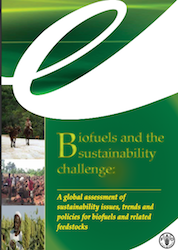This week the 12th session of the Open Working Group on Sustainable Development Goals began at the United Nations in New York City. In response to the meeting, the Global Renewable Fuels Alliance (GRFA) is encouraging participants to include specific targets for biofuels developments as part of UN’s sustainability goals. In addition, GRFA stressed to delegates that the use of sustainable biofuels as a replacement for crude-based ![]() transportation fuels significantly reduces greenhouse gas emissions while diving investments in agriculture.
transportation fuels significantly reduces greenhouse gas emissions while diving investments in agriculture.
“As participants continue to set new UN Development Goals for the next fifteen years they must keep in mind the positive affects that the global biofuels industry has on agriculture, the environment and the energy sector,” said Bliss Baker, spokesperson for the GRFA.
According to GRFA, the global ethanol industry alone this year will produce 90.38 billion litres of ethanol which will help the environment by reducing GHG emissions by 106.4 million tonnes. This year’s production record will reduce global GHG emissions by over 291,000 tonnes per day. This is equal to 21,279,808 cars being removed from the world’s roads in 2014 OR removing more than all of the vehicles registered in Malaysia off the road each year.
“Global biofuel production and use leads to a more sustainable environment because ethanol use is the largest single contributor to GHG reductions in transportation and the only commercially available alternative to crude oil,” added Baker.
The agriculture sector has also benefited from biofuels production over the years as developing countries adopt biofuel-friendly policies, said Baker. According to a recent publication of the United Nations Food and Agriculture Organization (UN FAO), “Increased agricultural productivity and output has ensured that the global supply of crops available for non-biofuel uses has continued to grow over the long term.” Additionally, for every tonne of cereals used for ethanol production, on average one-third re-enters the food chain as animal feed. The UN FAO confirmed this in its report “Biofuels and the Sustainability Challenge,” stating that “the by-products of biofuel production can be useful sources of food”.
non-biofuel uses has continued to grow over the long term.” Additionally, for every tonne of cereals used for ethanol production, on average one-third re-enters the food chain as animal feed. The UN FAO confirmed this in its report “Biofuels and the Sustainability Challenge,” stating that “the by-products of biofuel production can be useful sources of food”.
“In short, the global biofuels industry has increased the amount of food available for human consumption and feed available to farmers for livestock around the world,” said Baker.
The creation of sustainable green jobs going forward has become a priority for governments around the world. In 2012 the GRFA released a report that found that in 2010, global ethanol production supported nearly 1.4 million jobs in all sectors worldwide and contributed over $273 million to the global economy. A recent IRENA commissioned report confirmed that the global biofuels industry has grown, finding that in 2013, 1.45 million jobs were supported by the global liquid biofuels industry.
“It’s clear that because of the global biofuel industry’s ability to reduce our reliance on crude oil, reduce GHG emissions, increase agricultural productivity and create millions of jobs, the UN’s Sustainable Development Goals post 2015 must encourage further growth of the global biofuels industry,” concluded Baker.

